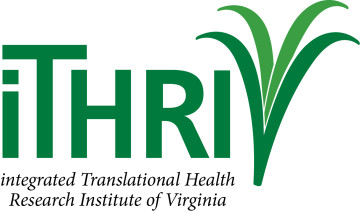
Scholars at iTHRIV Symposium Stress Collaboration, Community Engagement

The importance of team science, data quality, and community engagement were among the themes that emerged during the iTHRIV Scholars Symposium, which featured presentations from the program’s current participants as well as alumni.
Phil Bourne, the founding dean of the University of Virginia’s School of Data Science, opened the event by noting that “the need to embrace team science” was critical to the intersection of biomedical research and data science, disciplines at the heart of the mission of the iTHRIV scholars program.
He added that perhaps the most important guiding principle was community engagement.
“The notion of societal benefit and community engagement is absolutely key to all of this,” he said of the work being done by iTHRIV and its researchers.

The integrated Translational Health Research Institute of Virginia, or iTHRIV, is a federally funded collaboration aimed at facilitating clinical and translational research throughout the state. Its scholars program offers early career faculty from partner institutions – UVA, Virginia Tech, and the Carilion Clinic – the opportunity to develop their clinical translational research career through mentoring and sessions on data science and other critical skills.
In the first presentation, participants signaled that one of the program’s goals of fostering collaboration and teamwork was achieved during their partnership, saying that the relationships they built working together were a highlight of their experience.
They shared their analysis of racial and gender representation in large clinical trials, finding that trials that led to drug approval had more white and female participants. However, a large percentage of trials did not report gender or race, the group found, highlighting the importance of data quality.
This was a point raised by Renée Cummings, an assistant professor of the practice in data science at UVA, who delivered keynote remarks on the need to promote ethical and responsible uses of artificial intelligence.
“I think health care is one of the places and the spaces that the world is looking at when it comes to the many ways in which we can use data science and use artificial intelligence to deal with some of the challenges that we’ve had,” she said.
She noted that some of the health care challenges that have been seen were related to data quality and collection, arguing that “maybe we need to bring a more inclusive approach to the ways in which we are thinking about health care and innovation.”
The second group of scholars focused on academic medical centers and marginalized communities, including groups who have been underrepresented in research. They looked at how trust could be established between researchers and community members and best practices for conveying health research findings to those communities.
“Authentic relationship building is a key component,” said Rose Nevill, a group member and as assistant professor with UVA’s School of Education and Human Development.
Among their recommendations when conducting research, she said, was that “researchers must be willing to share their authentic selves with participants to help build that trust early on.”
The event concluded with presentations by recent iTHRIV alumni, a group that included Gregory Madden, a UVA Health physician and recent alum of the online master’s program offered by the School of Data Science, who discussed his research on C. difficile infection.